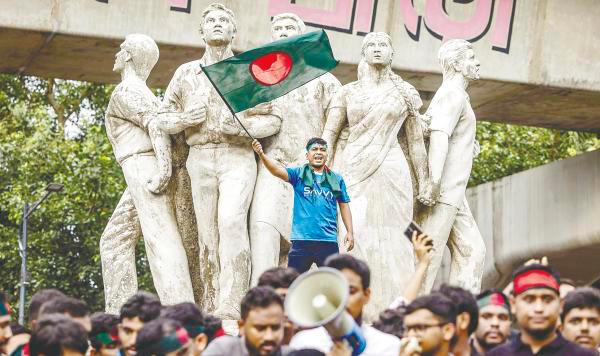IN the throbbing heart of Dhaka, a scene unfolded that was not just dramatic – it was cataclysmic. The Iron Lady of Bangladesh, Sheikh Hasina, witnessed the implosion of the fortress she built on the shifting sands of privilege and cronyism.
This was not your garden-variety protest, this was an all-out insurrection, a raw and visceral repudiation of years of cultivated elitism and suppressed voices that screamed for justice in the streets where it mattered most.
Hasina, once celebrated on the world stage as a beacon of progress and female empowerment, saw her meticulously crafted image disintegrate in the very streets that once cheered her name.
The longest-serving female head of state was dethroned not by political rivals or foreign agents but by the very people whose future she claimed to champion – the indomitable youth of Bangladesh.
This uprising was no mere demonstration, it was the battle cry of a populace suffocating under the noxious fumes of autocracy and nepotism.
In Hasina’s Bangladesh, the scales of opportunity were not just tipped – they were grotesquely warped. A staggering 56% of civil service jobs were earmarked not for the brightest or the most qualified but for those who had the “right” ancestors. It was a flagrant mockery of meritocracy, a spit in the face to every young soul striving for a fair shot.
The quota system – scraped up from the ashes of discontent and then resurrected like a despotic phoenix – became the grotesque symbol of all that was rotten in Dhaka.
More than just a policy, it was a monolith to the corruption of democracy, illuminating just how far the state had strayed from the bloody ideals of its inception in 1971.
The youth, the professionals and the everyday citizens, they saw through this farce. Their initial optimism for peaceful change was met with the iron fist of a regime paranoid of its own shadow.
The more the state clamped down, the more the streets erupted with the fury of the disenfranchised, the overlooked and the outright furious.
Hasina’s fatal misstep came when she dared compare her own country’s protesters to the Razakars, the reviled villains of their war of independence. It was not just a political blunder, it was the spark that ignited a powder keg of fury.
The backlash was not merely vocal, it was ferocious. The ensuing government crackdowns – killings, detentions and a veritable war against its own people – were her desperate, clawing attempts to stuff the raging genie back into the bottle.
But the blood spilt in these streets did more than mark the pavements; it watered the seeds of a revolution that could no longer be contained.
The imagery of Hasina fleeing the country – her exit far from the dignified retreat of a respected stateswoman but rather the desperate escape of a tyrant ousted by her own – will be etched in the collective memory of a nation betrayed.
The legacy of her father, once her shield and banner, could no longer shield her from the harsh judgement of history. The memorial museum, once a shrine, now stands as a bitter reminder of the perils of power misused and trust betrayed.
Now, as the military steps in with promises of order and elections, Bangladesh stands at a precipice. The task at hand is monumental, not just to unseat a dictator but to dismantle an entire system of institutionalised discrimination and privilege.
Will the architects of Bangladesh’s new dawn construct a society that values fairness over favouritism or will they merely patch up the cracks, hoping the facade holds until the next upheaval?
Bangladesh, vibrant with potential and seething with the energy of its youth, teeters on the brink of a new era. The streets have roared their verdict, shaking the foundations of power.
Will the corridors of authority reverberate with the echoes of this demand for change or will they retreat, cloaked in the shadows of old fears and outdated allegiances?
The road ahead is fraught with challenges but it beckons with the promise of a nation reborn – a nation striving to replace the rot of cronyism with the robust pillars of meritocracy, justice and unabashed truth.
The writer is an entrepreneur with a passion for politics and international affairs. As a world traveller, his global experiences enhance his photography and literary work, providing unique insights and perspectives. Comments: letters@thesundaily.com









